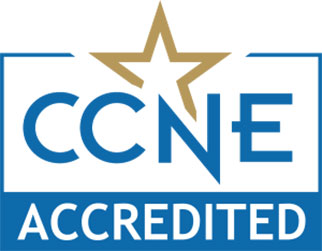Online AGACNP Certificate Overview
Enhance your MSN education by building a specialized skill set for complex care settings including emergency, intensive care, and trauma.
The post-master’s online AGACNP certificate at King University delivers the evidence-based approaches, clinical research, and practical experience you need to meet national demand for skilled acute care nurse practitioners for adults and geriatric patients in the acute care setting.
You will study essential topics such as:
- Physical assessment
- Health promotion
- Acute care diagnosis and skills
- Care of adults and geriatric populations
- Adult acute care
- Practice management
As a King student, you will have access to a dedicated clinical placement coordinator and certification preparation throughout your program. You will also complete the 600 practicum hours required to pursue AGACNP certification. You will have access to a dedicated clinical placement coordinator to assist with clinical placement. Certification preparation is integrated throughout your program and upon graduation from the AGACNP Post-Master’s Certificate program you will be eligible to sit for the national AGACNP certification exam.
The Post-Master’s AGACNP Certificate is Designed for…
Working nurses who possess an MSN and are ready to advance their careers and who want to manage the care of adult and geriatric patients in various acute care settings.
Courses and Requirements
Our online post master’s AGACNP certificate requires 18-30 credit hours and 600 practicum hours for completion. An individualized plan of study will be developed based on previous master’s-level transferrable coursework completed. To enhance the online learning experience students are required to attend one to two day on-campus intensive sessions at the beginning of each semester. A portion of the intensive sessions is used to complement the online learning experience through application of knowledge and skills through clinical simulation and hands on skills activities.
This course prepares nurses with advanced knowledge and understanding of the pathologic mechanisms of disease to serve as a foundation for clinical assessment, clinical decision-making, pharmaco-therapeutics, and nursing interventions. Course content examines deviations from homeostasis, genetic and epigenetic influences of disease in body systems across the lifespan. A systematic survey of diseases within body systems including etiology, epidemiology, and clinical manifestations is explored. Current research findings are explored and utilized in this class.
This course focuses on the development and practice of advanced health assessment skills needed for delivery of culturally competent care across the lifespan. Diagnostic reasoning is used to interpret data obtained from the history, physical examination, and diagnostic procedures to generate a comprehensive health assessment and problem list. Domains of interest include family processes, transcultural issues, nutrition, genetic variations, growth and development, spirituality, and health promotion. Students refine the health assessment and clinical judgment skills needed to relate findings to underlying pathophysiologic changes in the client’s health status to plan therapeutic and healing interventions.
This course provides the advanced knowledge of pharmaco- kinetics, pharmacodynamics and pharmaco- therapeutics needed to initiate safe and appropriate pharmacological treatment in the management of disease processes across the life span. Special concerns regarding developmental status, nutritional status, health status, cultural influences or membership in a high-risk group are identified. Strategies for counseling and education to promote adherence are explored. Ethics, cost effectiveness, legalities and regulations related to prescription writing are addressed. Students are introduced to the use of electronic drug databases for point-of-care decision-making based on up-to-date drug information.
This course examines issues related to assuming the advanced practice role including the legal and ethical aspects of practice, quality assurance issues, patient advocacy, leadership, interdisciplinary collaboration, and the stewardship of resources. Emphasis is placed on demonstrating a clear understanding of the professional nurse practitioner role and the transition to the professional clinicians’ role, including certification and licensure requirements. Current practice issues affecting nurse practitioners are examined.
This course introduces clinical knowledge and decision-making skills related to the use of an evidence-based approach in the clinical management of the adult-gerontology population. In addition, the course includes study and clinical application of major theories of health promotion, risk assessment, differential diagnosis, health behavior change, disease prevention, preventing complications, and restoring maximum health in the adult population. Cultural, socioeconomic, and ethical factors are explored. Through collaboration with a preceptor, the clinical component of this course provides the opportunity for the AGACNP student to implement evidence-based practice interventions that promote safety, risk reduction, and prevention of complications for those adult patients with complex and/or chronic illness needs.
This course is a survey of the knowledge and skills necessary to provide and coordinate evidence-based care for those individuals with acute, critical, and complex physical/mental illnesses who are physiologically unstable, technology dependent, and/or highly vulnerable to complications. Content will be centered on assessing, diagnosing, designing, and implementing evidence-based treatment in the critical care setting. There will be a focus on those skills. required to utilize technology/devices and clinical decision support technology to assist the rapidly deteriorating patient. The student will develop advanced knowledge related to the management and coordination of adult and older adult patients at risk for urgent/emergent conditions and be able to prioritize those patients demonstrating rapid physiologic or mental health deterioration and/or life- threatening instability. Additionally, the student will explore concepts and skills related to the management of stress for the patient/family surrounding transition to a higher level of care and be able to discuss sensitive issues such as end-of-life decisions with the patient, family, and caregivers. The clinical component of this course provides an opportunity for the student to implement and practice skills and expertise introduced in the didactic content under the guidance of a qualified preceptor.
This is the final course in acute care of adults and older adults. Students will continue to expand upon the knowledge and skills needed to care for adults and older adults in the acute care setting. Content will focus on interprofessional communication and collaboration for optimal patient outcomes, facilitation of transition of patients to a higher level of acute care, exploration of types and levels of services provided in complex health care settings, and challenges to care in the acute care setting. This course will continue to emphasis the use of evidence-based practice in clinical decision making. Students will work with a preceptor to continue to enhance the clinical skills needed to care for adults and older adults in the acute setting. Additionally, students will focus on interprofessional communication and collaboration as part of the health care team caring for patients with acute and complex needs.
*AGACNP faculty will conduct a gap analysis to determine if these courses taken in your MSN program are transferable to the Post-MSN Certificate.
Admission Requirements
Students applying for the online post-master’s FNP certificate program must meet the following requirements:
- A Master of Science in Nursing from a regionally accredited nursing program.
- A minimum of a 3.0 GPA or better on a 4.0 scale on all prior academic work.
- Students with less than a 3.0 GPA may be considered and accepted on a conditional basis, provided they are able to demonstrate their plans to succeed in the program.
- Undergraduate coursework completed with a C grade or better in the following disciplines:
- Statistics
- Nursing research/Evidence-based practice
- Health assessment
- Pathophysiology (highly recommended but not required)
- Current unrestricted licensure to practice as a registered nurse in Tennessee (compact/multi-state accepted) with privileges to practice in Tennessee. Applicants should not be on probation and must report any past or current disciplinary action taken by a state board directly to the dean of the School of Nursing.
- Computer with Microsoft Office 365, and webcam capability is required. Microsoft Office 365 is available to all King students to load on the PC or Mac and is accessible at Office.com using their King University credentials. Chromebooks and many tablets will NOT meet the minimum requirements for the SON Programs.
Students applying for the online post-master’s FNP certificate program must submit the following materials:
- A completed application through NursingCAS.**
- Official transcripts from all institutions attended***
- Verification of current unencumbered registered nurse license from Tennessee or a compact licensure state, or the state where you will complete your clinical hours.
- Copies of all certificates in an area of clinical concentration, if applicable.
- A current curriculum vitae.
Have questions about this program or the admissions process? Request information and get connected to one of our knowledgeable enrollment counselors.
Post-Acceptance Requirements
Within the first semester of your program students will also be required to provide the following documents
- Two letters of recommendation, preferably one from an employer and one from a previous college professor. When applying online, students may submit the names and email addresses of individuals offering a recommendation to automate the process.
- A two- to three-page typed writing sample to address the following question: What is the role of graduate education in preparing nurses to meet the health needs of our society? Writing sample must cite two peer-reviewed journals and be written using APA style.
**The application process for this program is an online application system provided by a Centralized Application Service made available by our accrediting agency.
***Courses are applicable for transfer if they are applicable to the requirements of the program and are approved by the specialty area faculty and the dean of the School of Nursing. Courses being transferred must have been assigned a grade of B or higher and must have covered content which is required for a particular core course or specialty program.
Career Outcomes
Graduates of the online AGACNP certificate are eligible to pursue national adult gerontology acute care nurse practitioner certification and apply for advanced practice nursing licensure as appropriate in their legal state of practice. Upon obtaining certification and advanced practice licensure graduates will be eligible to apply for AGACNP positions in various acute care settings.


The School of Nursing programs are fully approved by the TENNESSEE BOARD OF NURSING, and are a member of the AMERICAN ASSOCIATION OF COLLEGES OF NURSING.
The baccalaureate degree program in nursing and master’s degree program in nursing at King University are accredited by the Commission on Collegiate Nursing Education.

Studying online prepares you for a successful future. Discover a learning format that offers:
- Flexibility and Convenience
- Personalized Academics
- Equal Excellence
- Opportunity for Self-Insight
